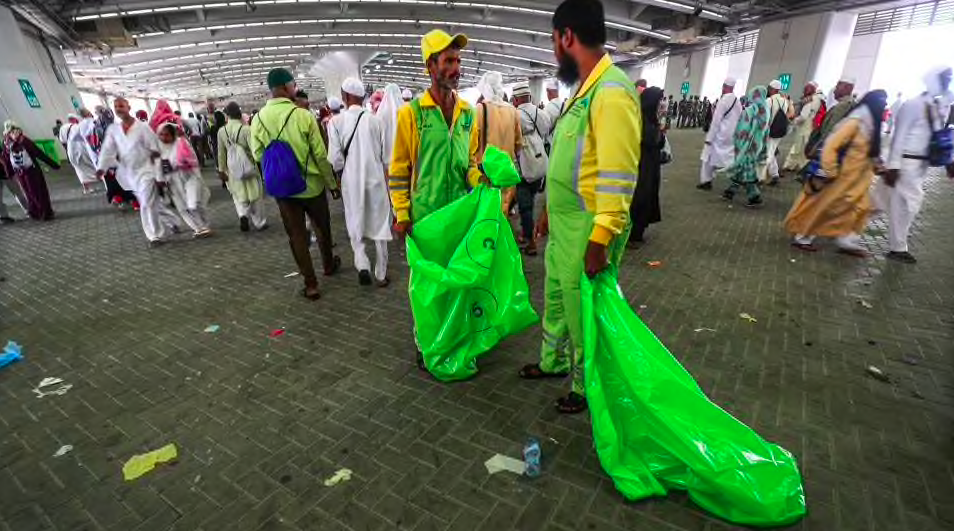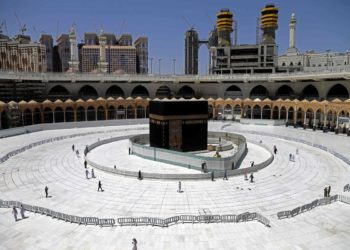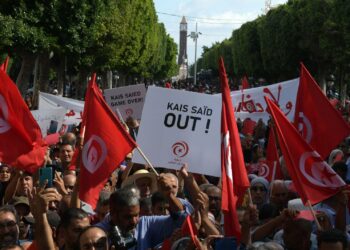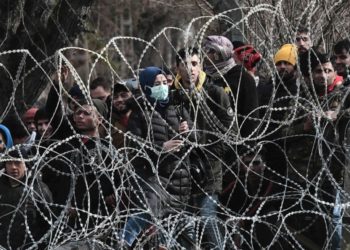Over two million Muslims headed home last month from Mecca, Saudi Arabia, after performing the Hajj, the annual religious pilgrimage that is mandatory for all financially and physically capable Muslims at least once in their lives.
The city, with a population of 1.8 million, also receives a constant influx of pilgrims year round. They arrive to pray at the Grand Mosque, which surrounds the Kaaba, Islam’s holiest site.
Just in 2017, Mecca received over 2 million pilgrims for the Hajj alone, 2 million during the holy month of Ramadan, and another 4 million pilgrims for Umrah, a non-mandatory minor pilgrimage that, unlike the Hajj, takes place year-round, according to official figures by Saudi Arabia’s Ministry of Hajj and Umrah.
A pilgrimage visa is required to perform the Hajj or Umrah. These visas are usually valid for approximately 2 weeks and do not permit work or residency.
And, for decades, many people seeking work in Saudi Arabia have been overstaying their Hajj and Umrah visas to permanently relocate to Mecca.
“Mecca is one of the most ethnically diverse cities in Saudi Arabia, and it’s not just because of all the pilgrims from around the world coming in and out of the city all year long,” Abdullah Harith, a migrant lawyer working in the Gulf countries, told The Globe Post. “At least 45 percent of Mecca’s population is made up of non-Saudis, and while some of them are expats, most are second and third generations of undocumented migrants.”
Some came to earn a living or to have a better standard of living than they could afford in their countries of origins. At the same time, some were inspired by the sanctity of the city.
“For the most part, the Saudi government just chose to ignore them for years,” Harith said. “If anything, it’s a bad move politically. Every Muslim considers Mecca a second home and it just wouldn’t have made good headlines.”
The Burmese, for instance, is now one of the oldest and most established non-Saudi communities in Mecca, who first came to the country by the thousands in 1948 to claim political asylum. Today, there are nearly 250,000 Burmese living in Mecca.
“They are the success story of immigrants in Saudi Arabia,” Harith said. “They have been around for so long and have an extremely organized community in the city and even beyond in the rest of the Kingdom. And they were finally allowed permanent residency in 2015 – and this has never happened for a migrant group in the Kingdom before.”
Others communities of undocumented citizens include many from countries in the Horn of Africa and South Asia.
“I moved here in 2003 with my husband and three kids,” Tasneem Maksood, a 43-year-old Bangladeshi woman living in Mecca, told The Globe Post. “We came on an Umrah visa in Ramadan and my husband got a job as a mechanic in the outskirts of the city. The pay was better than in Bangladesh, and why would anyone deny the blessing of having an opportunity to live in Mecca?”
But they have not been as lucky as the Burmese.
“I think the Burmese moved here in waves at the right time,” she said. “The country was younger and probably more accepting of different groups of people, and it probably helped them settled in well. Other newer communities leave everyone on their own and it didn’t work out for us.”
Tasneem’s husband was caught during a raid and deported back to Bangladesh in November 2017.
“The authorities just came in at his work one day and asked to check everyone’s legal documents,” she says. “It was just about being in the wrong place at the wrong time. He was deported immediately, but I am staying behind. I have a job here and it’s supporting my family – there is nothing for us to go back to.”
Tasneem’s husband is one of the many undocumented migrants in Saudi Arabia who have been deported recently.
According to local media reports, there are currently over 5 million undocumented migrants residing in Saudi Arabia, a country with an official population of 33 million. But the Kingdom is now actively seeking to deport them as part of its new economic reforms agenda.
Highlighting a stat that's rarely mentioned when looking at Saudi Arabia's modernization efforts: Immigrants make up 37% of pop., one of highest in the world | Migrants Are on the Rise Around the World, and Myths About Them Are Shaping Attitudes @nytimes https://t.co/ifblJVaHYp
— Molly O'Toole (@mollymotoole) September 10, 2018
A campaign called “Nation Without Violators” was launched in 2017 that aims to “progress to deport foreign workers illegally staying in violation of residence, labor, and border regulations of the Kingdom.”
“A 90-day amnesty began in March 2017 that allowed undocumented migrants to finalize their status and leave the country without any penalties,” Harith said. “Those overstaying their visas could just directly go to any border point with a valid passport and travel tickets.”
The amnesty was extended twice and, according to government statistics, security authorities deported at least 800 violators per day during the 9-month period. Ever since, security authorities have been actively carrying out raids and crackdowns to identify and deport people without valid residencies.
And the Mecca region has been recorded to have the highest percentage of violating deportees – nearly 38 percent of all deportations so far have taken place in the holy city.
“Security authorities have confirmed that they have been carrying out raids on commercial establishments and other suspected sites to verify residency law commitments and detect violators,” Harith said. “Employers have also been warned to not give shelter to any illegal expatriate worker and asserted that government agencies participating in the national campaign.”
Violating the residency system entails deportation, a prison sentence, and fines ranging from SR15,000 ($4,000) to SR100,000 ($26,700).
For many undocumented migrants like Tasneem, this hasn’t just resulted in uncertainty about their futures but also enabling exploitation by their current employers.
Tasneem, who works as a cleaning staff for a local clinic, said her employers have not paid her for the past three months.
“They haven’t reported me so I am grateful but, at this point, everything is beyond my control,” she said. “If I get caught one day, then I go back. It may be God’s city but it’s their country. We will leave when we are asked – what else can we do?”
Pakistani Migrant Workers Lack Basic Protections in Saudi Arabia























